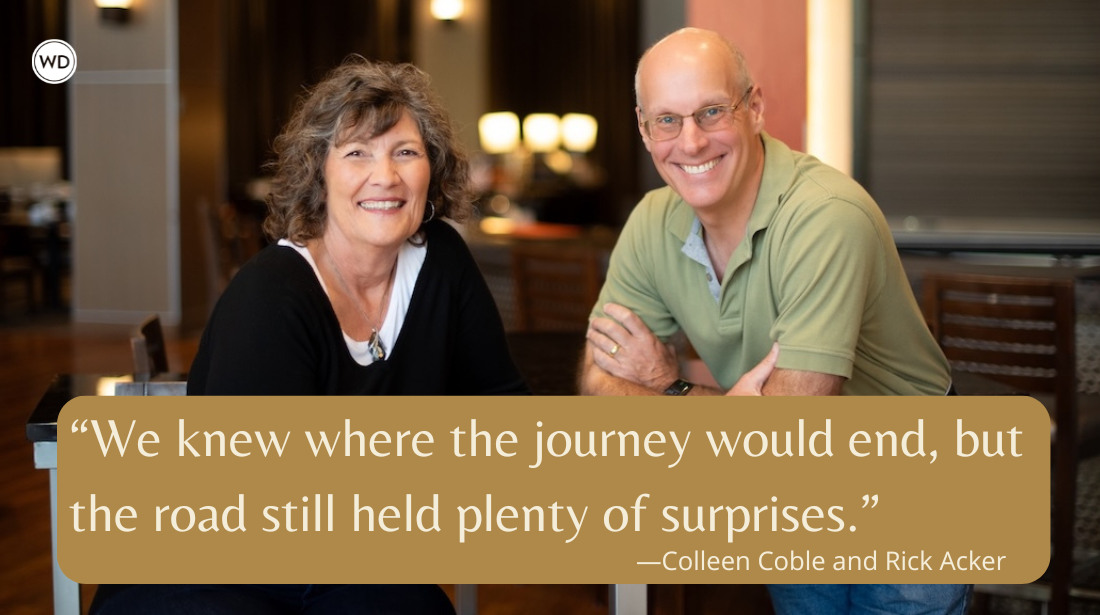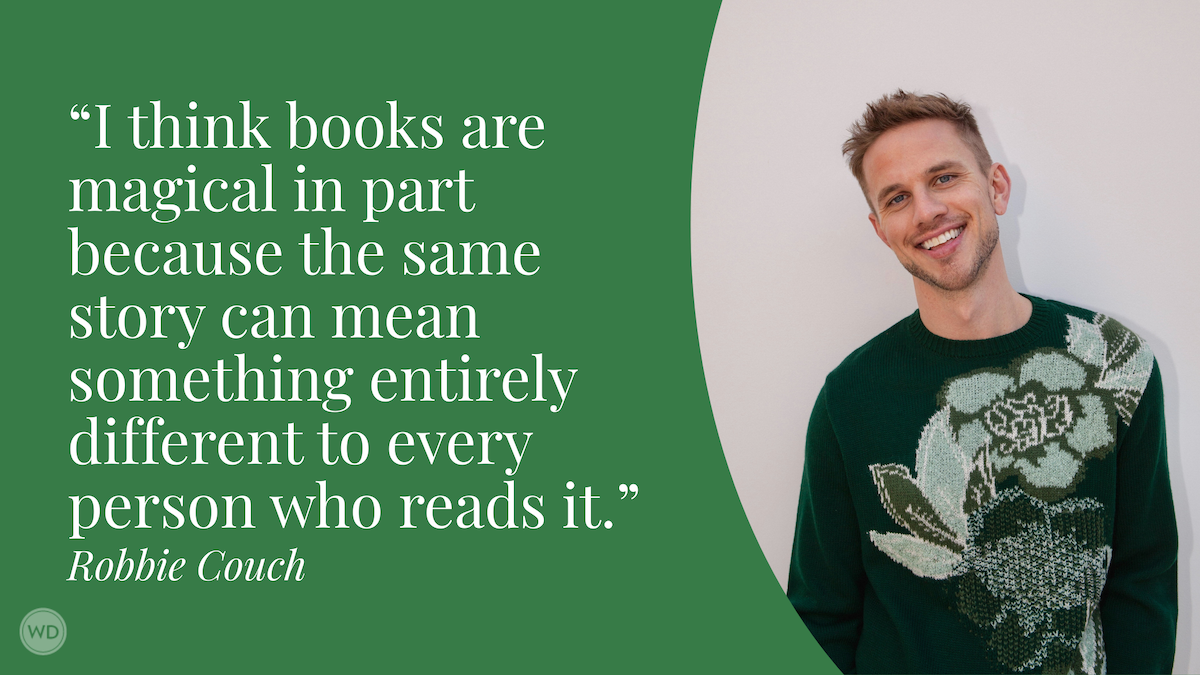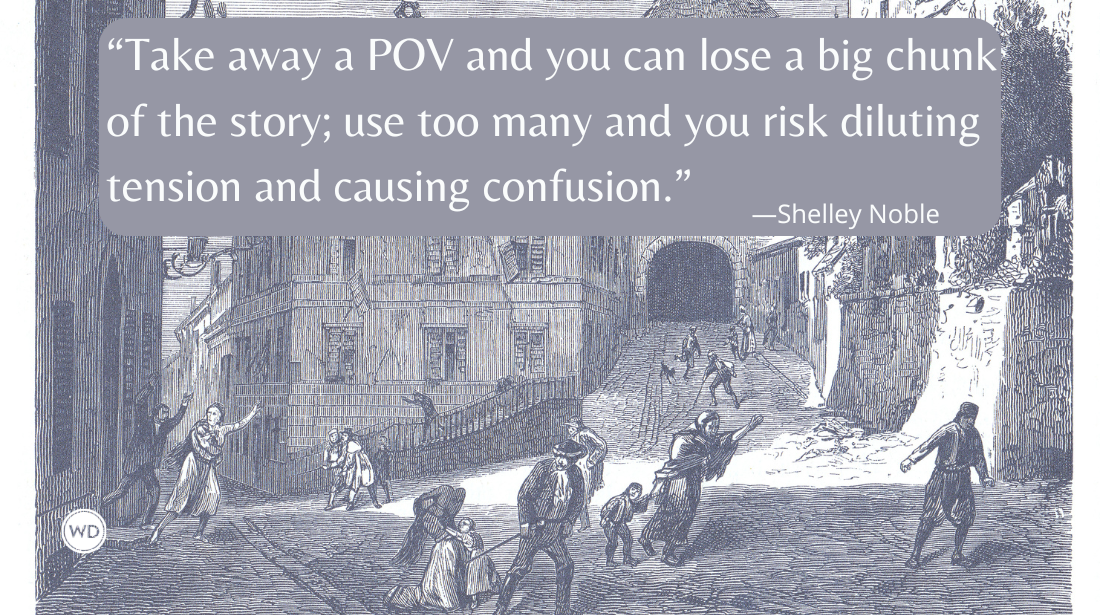A Conversation With James Comey on Writing Fairly and Making Stories Linger (Killer Writers)
Clay Stafford has a conversation with thriller author and former FBI Director James Comey on writing fairly and making stories linger.
I recently had the chance to sit down with James Comey to talk about his new novel, FDR Drive. Most people recognize him as the former FBI Director, a man shaped by decades of grappling with ambiguity and finding the line between justice and mercy. But in FDR Drive, Comey steps fully into the role of storyteller, crafting a book that captures the moral complexity of a world where right and wrong often occupy the same space. What follows is our conversation about how he approaches character, tension, and contested ideas, and how writers can apply those lessons to their own work.
“James, one of the things that stood out to me in FDR Drive was how fairly you treated every character, regardless of their role. As a reader, I felt like I could understand why someone acted a certain way, even when I disagreed with them. What guides you when tackling contested spaces like this?”
“The starting point for me is looking back at the hard questions I dealt with as FBI Director and as a federal prosecutor. Those were moments where you had to recognize that good people can disagree sharply about serious questions. In FDR Drive, I drew from that experience to explore one of the tensions I grappled with in government: Where does free speech end and a crime begin? In a country that cherishes its First Amendment, when someone uses words to incite others to harm, how do we respond? That tension became central to the story. The challenge is finding a path between two deeply held values: free expression and the need to protect innocent people. To write about that authentically, I had to focus on the people: What do they fear? What do they justify to themselves? What compromises have shaped their character? That’s what gives a scene its weight.”
“That came across clearly. The characters felt three‑dimensional because you gave space for both sides. What role does empathy play when you write characters with opposing motivations, especially when one side might be doing things you disagree with?”
“Empathy is everything when you write about contested ideas. What has long scared me about being human is how easily we can fall in love with our own virtue. In law school, one of the most valuable lessons I learned came from Professor Hans Tiefel, a German-American ethicist. Even before I went to law school, I took one of his classes in college. He would force us to write essays and give oral arguments for positions we disagreed with, ensuring we met the facts fairly and presented the opposing side with precision and honor. That lesson shaped me as a lawyer and, later, as a writer. The best lawyers understand that their role isn't just to win an argument; it's to serve the larger ideal of a fair system. You must passionately advocate for one side and then be able to turn around and passionately advocate for the other. It's humbling, and it's a lesson that applies beyond the law. In fiction, it means putting yourself in the character's shoes, seeing the world as they do, and presenting their motivations as honestly as possible.”
“That approach came through clearly. Even when one character is acting reprehensibly, you gave readers space to grapple with why. How do you balance making both sides compelling when one side might be overtly acting out of cruelty, greed, or hate?”
“The line between good and evil doesn’t run between people. It runs down the center of every human heart. I've worked with people who committed horrific acts. One witness I remember had killed 25 people for the Sicilian Mafia, almost all by strangulation. At first, I thought, ‘How monstrous.’ Yet, after hours and hours across a table from him, I learned about his deep love for his wife and how much he grieved for the pain he'd caused his children. Those moments don’t justify what he did, but they reveal that we’re complex creatures, a mix of wounds and convictions. In fiction, I try to capture that complexity. Not to excuse behavior, but to acknowledge that every person you write is shaped by forces that matter deeply to them. When a character justifies themselves, when you can imagine how their choices felt necessary to them, that character can live beyond the page.”
“That’s an intriguing lens. Do you ever worry about nudging readers too hard toward a specific viewpoint? How do you guard against making a character an extension of your own beliefs?”
“It's one of the biggest dangers for any writer, especially when dealing with controversial or polarizing ideas. It's tempting to write a character in a way that serves your worldview, making it a mouthpiece for what you already think. To guard against that, I have built in accountability. My wife reads every scene as I write it, and she has an uncanny sense for when I've fallen too much in love with one character or flattened another. My kids do the same. They’ll tell me when a character doesn’t sound like themselves anymore, when one voice is starting to sound like another, or when one character’s motivations seem too convenient. That external feedback is vital. It's humbling, and it reminds me that every character deserves to stand on their own. The goal isn't to win an argument or justify a position. The goal is to present a scene as authentically as I can and let readers draw their own conclusions.”
“That’s incredibly valuable for writers. Let’s talk about the process for a moment. You mentioned drawing from lived experience when creating certain characters. How consciously do you lean into those moments when plotting a scene?”
“Very consciously. The witness I mentioned earlier inspired one of the central characters in FDR Drive. When I write those moments, I close my eyes and try to remember how it felt to be across the table from him. What were the moments that revealed vulnerability? What about him felt monstrous? What felt heartbreakingly human? That approach gives a scene a charge. I’m not inventing conflict from nowhere; I’m recreating dynamics I’ve witnessed, and that gives readers a chance to grapple with those tensions themselves. It's fiction, but it's rooted in lived experience, which makes it feel more authentic.”
Check out James Comey's FDR Drive here:
(WD uses affiliate links)
“That’s evident throughout the book. Do you find that knowing those moments personally gives you more latitude when tackling morally ambiguous situations?”
“Definitely. It allows for specificity. When I picture a scene, I can draw on gestures, moments of silence, or unexpected reactions that shaped the experience for me. This doesn’t mean mimicking reality beat for beat, but it means allowing that lived experience to deepen the emotional core of the scene. For writers tackling controversial or ambiguous topics, I always advise going closer, not further away. Too often, when writers want to grapple with challenging ideas, the instinct is to flatten people into caricatures: the bad guy or the corrupt one. Getting closer means allowing readers to witness moments that complicate that view. The closer you get, the harder it is for readers to dismiss a character as one thing, the harder it is for you, as the writer, to make that character a symbol rather than a person.”
“That’s such an important takeaway: Get closer, deepen the character. What about tackling contested ideas as a writer? In an increasingly polarized world, what’s your best piece of advice for writers trying to grapple with difficult issues?”
“Stay rooted in the lived reality of character. Whatever your topic, ask yourself, ‘How would this person justify themselves?’ Get as close as you can. Let the reader witness that internal process. And remember: It's so easy and lazy to say, ‘Everyone who disagrees with me is an idiot or evil.’ It takes more work, more humility, to recognize that someone can disagree passionately with you and still operate from a place of conviction, shaped by their own experiences and understanding of the world. That doesn’t mean excusing behavior. It means understanding it. When you approach contested ideas with that lens, you write deeper stories and create moments that linger long after the book is closed.”
“That reminds me of a story you’ve shared before, about teaching a class called Policing Inside Out at Howard University. Could you talk about that? It feels relevant to how writers can grapple with contested ideas.”
“Absolutely. After I was fired from the FBI, I taught a class called Policing Inside Out at Howard University, a historically Black college. The class was intentionally structured to encourage students and active-duty police officers to engage with and grapple with contested ideas. We brought together 15 Howard undergraduates, almost all Black, and 15 active‑duty officers from Baltimore, Washington, and Charlotte. At the beginning of the semester, the two groups sat on opposite sides of the room, wary of one another. By the end, they were intermingled, openly sharing stories, challenging assumptions, and grieving the end of that time together. They didn’t necessarily agree by the final day, but they came to understand each other as human beings shaped by their own worlds and struggles. That experience captures the core lesson for writers: Getting closer doesn’t erase differences, but it makes understanding possible. And understanding makes for richer, more honest stories.”
“That’s an extraordinary example. Let’s shift to character voice. You mentioned earlier how your wife or kids will alert you when character voices start sounding too alike. What have you learned about keeping character voices distinct?”
“It’s an ongoing challenge. When you spend a long time with a character, it's easy for their voice to bleed into another's, especially when you’re deep into drafting and moving quickly between scenes. That’s where readers and editors you trust are vital. My wife, for example, will leave a comment like, ‘This doesn’t sound like Matty Parker anymore. This sounds like your other character.’ Those moments force me to slow down and reread aloud. The sound of a character’s voice, the rhythm, the word choice, and the worldview embedded in their lines are like a fingerprint. Getting that right takes time, and it takes listening. The lesson for writers is to revisit character voices frequently and to seek help from trusted readers. It's easy to lose track when you're deep in the scene, but the voice is the character. It's worth getting right.”
“That’s great advice. Let’s talk about endings for a moment. As a writer, how do you balance making an ending feel both authentic and satisfying, especially when dealing with morally ambiguous stories?”
“It’s a hard question, and one I continue to grapple with. In an earlier book, I left the ending intentionally ambiguous, allowing readers to draw their own conclusions about a character and their choices. In FDR Drive, I gave more concrete closure because it felt right for that character and that moment. Different readers want different things from an ending. Some want a hard stop, a sense that the character has arrived at a concrete destination. Others want an open door, a hint that the questions don’t end when the book does. What guides me is the character and the scene itself. What does this character need? What does this scene require? Will this ending linger? Will it reside in a reader long after they've put down the book? That’s the measure I use. Whatever the form, an ending must stay with the reader, long after they've finished reading.”
“That lingering quality is one of the things I admired most about FDR Drive. For writers grappling with contested ideas, especially in a time when readers can be quick to judge, what final thought would you leave them with?”
“Get closer. Stay curious. Resist the lazy instinct to flatten people into caricatures. Let your characters justify themselves and trust your readers to draw their own conclusions. It can be exhausting to grant someone the benefit of the doubt, to imagine the best case for a worldview you reject. But it’s worth it. The stories that linger, the stories that matter, are those that honor the complexity of being human. If you can do that, if you can recognize that every person, every character, operates with a mix of convictions, wounds, fears, and loyalties, you can write stories that live beyond the page.”
_____________________________
James Comey has been a prosecutor, defense lawyer, general counsel, teacher, writer, and leader. He most recently served in government as Director of the FBI. He has written two bestselling nonfiction books, A Higher Loyalty and Saving Justice, as well as three novels in his Nora Carleton crime fiction series. https://jamescomeybooks.com/









